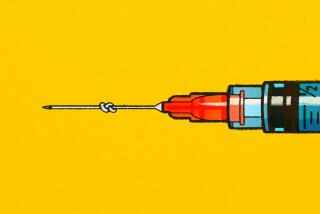Cosmetic surgery to fix what ails you? It doesn’t work.
- Share via
Several studies show that some people who repeatedly seek cosmetic surgery are afflicted with a mental disorder called body dysmorphic disorder. But undergoing a nip here, tuck there or a poke between the eyes does nothing to improve the mental condition of these people, according to a new study.
Body dysmorphic disorder is a condition in which people become preoccupied with their looks to the point of being obsessed over minor flaws or perceived imperfections. They often become so addled by their obsession over physical beauty they become dysfunctional in other aspects of their lives. Typically, such people are heavy users of cosmetic surgery. Some doctors are willing to abide by the demands of patients with the disorder even though medical guidelines suggest that such patients undergo psychological counseling instead of cosmetic procedures. An estimated 7% to 8% of people who seek cosmetic surgery in the United States have the disorder.
In the new study, researchers sought to find out whether undergoing cosmetic procedures actually improves the symptoms of the disorder. In other words, if you’re a body dysmorphic disorder patient and are obsessed about the bump on your nose and you fix it, will you be less obsessed with your looks? The study was comprised of 200 people who had been diagnosed with the disorder. About one-third of the people in the study sought cosmetic surgery or some minimally invasive cosmetic treatment. About one-fifth of the people in the study actually received treatment.
Researchers at Rhode Island Hospital and Children’s Hospital of Philadelphia found that only 2% of the procedures seemed to help relieve the symptoms of the disorder. Only 25% of the treated patients thought their appearances were improved due to the treatment. In some patients, the symptoms of body dysmorphic disorder actually worsened.
The researchers also polled 265 cosmetic surgeons and found that 65% said they had treated people with the disorder. But only 1% of the cases led to improvement in disorder symptoms.
People can be successfully treated for the disorder, but the scalpel or syringe isn’t the best method, the authors of the paper said.
“[P]hysicians need to be aware that psychiatric treatments for BDD such as serotonin reuptake inhibitors and cognitive behavioral therapy appear to be effective for what can be a debilitating disorder,” the researchers wrote.
The study appeared in the July issue of the Annals of Plastic Surgery.
-- Shari Roan / Los Angeles Times
Return to Booster Shots blog.






